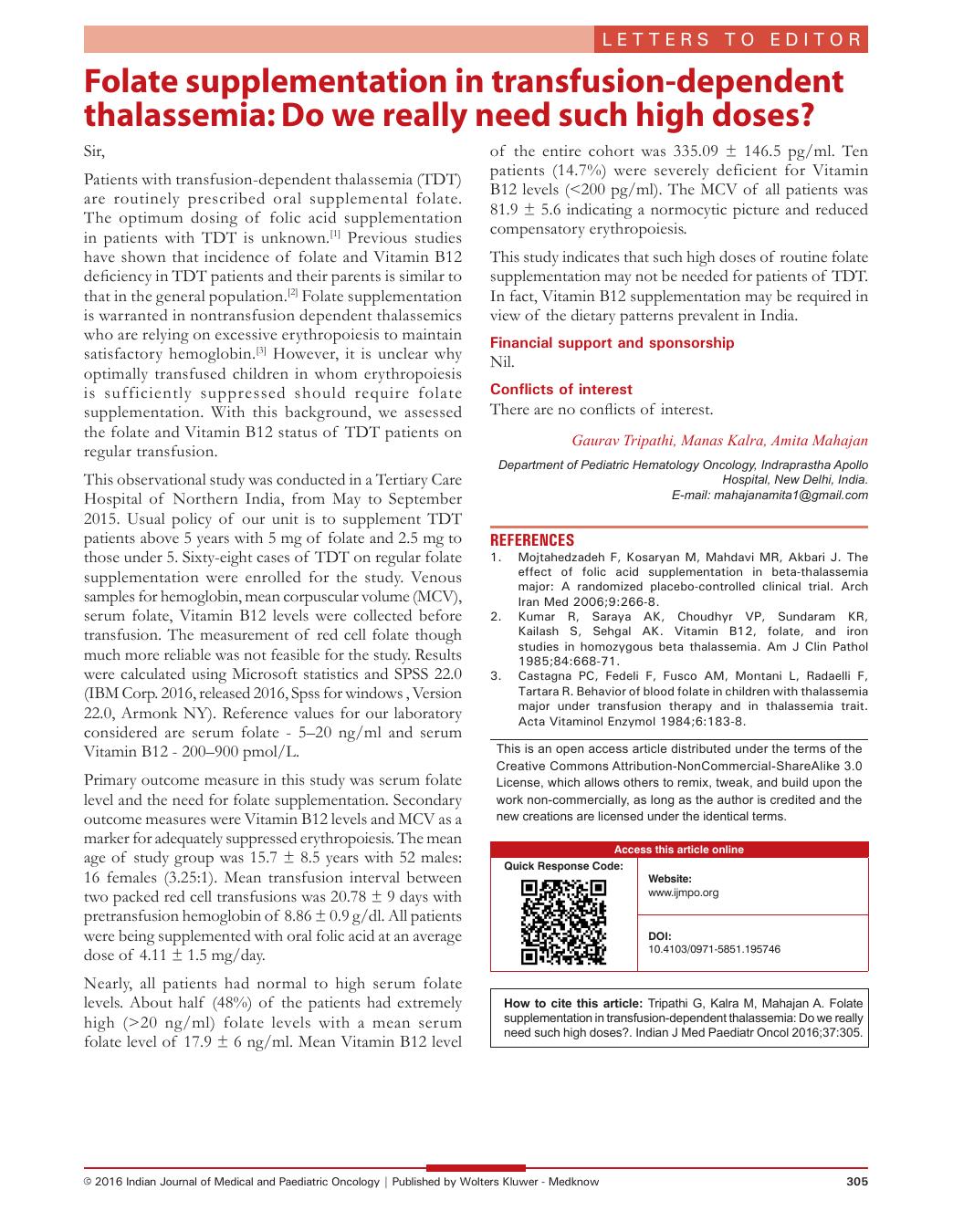Folate supplementation in transfusion-dependent thalassemia: Do we really need such high doses?
CC BY-NC-ND 4.0 · Indian J Med Paediatr Oncol 2016; 37(04): 305
DOI: DOI: 10.4103/0971-5851.195746

Publication History
Article published online:
12 July 2021
© 2016. Indian Society of Medical and Paediatric Oncology. This is an open access article published by Thieme under the terms of the Creative Commons Attribution-NonDerivative-NonCommercial-License, permitting copying and reproduction so long as the original work is given appropriate credit. Contents may not be used for commercial purposes, or adapted, remixed, transformed or built upon. (https://creativecommons.org/licenses/by-nc-nd/4.0/.)
Thieme Medical and Scientific Publishers Pvt. Ltd.
A-12, 2nd Floor, Sector 2, Noida-201301 UP, India
Sir,
Patients with transfusion-dependent thalassemia (TDT) are routinely prescribed oral supplemental folate. The optimum dosing of folic acid supplementation in patients with TDT is unknown.[1] Previous studies have shown that incidence of folate and Vitamin B12 deficiency in TDT patients and their parents is similar to that in the general population.[2] Folate supplementation is warranted in nontransfusion dependent thalassemics who are relying on excessive erythropoiesis to maintain satisfactory hemoglobin.[3] However, it is unclear why optimally transfused children in whom erythropoiesis is sufficiently suppressed should require folate supplementation. With this background, we assessed the folate and Vitamin B12 status of TDT patients on regular transfusion.
This observational study was conducted in a Tertiary Care Hospital of Northern India, from May to September 2015. Usual policy of our unit is to supplement TDT patients above 5 years with 5 mg of folate and 2.5 mg to those under 5. Sixty-eight cases of TDT on regular folate supplementation were enrolled for the study. Venous samples for hemoglobin, mean corpuscular volume (MCV), serum folate, Vitamin B12 levels were collected before transfusion. The measurement of red cell folate though much more reliable was not feasible for the study. Results were calculated using Microsoft statistics and SPSS 22.0 (IBM Corp. 2016, released 2016, Spss for windows, Version 22.0, Armonk NY). Reference values for our laboratory considered are serum folate – 5–20 ng/ml and serum Vitamin B12 – 200–900 pmol/L.
Primary outcome measure in this study was serum folate level and the need for folate supplementation. Secondary outcome measures were Vitamin B12 levels and MCV as a marker for adequately suppressed erythropoiesis. The mean age of study group was 15.7 ± 8.5 years with 52 males: 16 females (3.25:1). Mean transfusion interval between two packed red cell transfusions was 20.78 ± 9 days with pretransfusion hemoglobin of 8.86 ± 0.9 g/dl. All patients were being supplemented with oral folic acid at an average dose of 4.11 ± 1.5 mg/day.
Nearly, all patients had normal to high serum folate levels. About half (48%) of the patients had extremely high (>20 ng/ml) folate levels with a mean serum folate level of 17.9 ± 6 ng/ml. Mean Vitamin B12 level of the entire cohort was 335.09 ± 146.5 pg/ml. Ten patients (14.7%) were severely deficient for Vitamin B12 levels ( < 200 pg/ml). The MCV of all patients was 81.9 ± 5.6 indicating a normocytic picture and reduced compensatory erythropoiesis.
This study indicates that such high doses of routine folate supplementation may not be needed for patients of TDT. In fact, Vitamin B12 supplementation may be required in view of the dietary patterns prevalent in India.
Financial support and sponsorshipNil.
Conflicts of interest
There are no conflicts of interest.


 PDF
PDF  Views
Views  Share
Share

